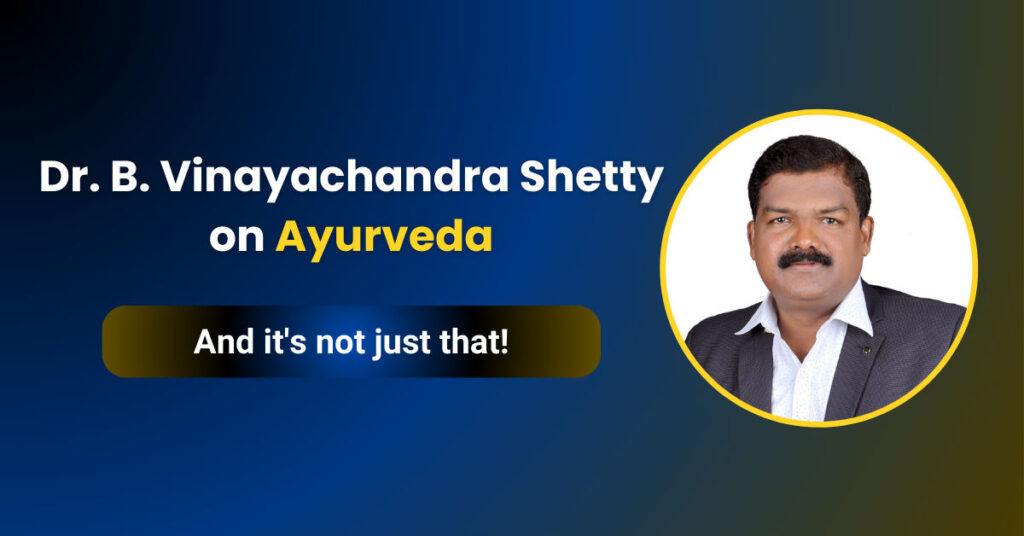Along with curing diseases, how healthcare professionals like Dr. B. Vinayachandra Shetty help us?
It’s through educating the society by sharing their experience, knowledge, and expertise.
if you can observe closely, many passive learnings can be captured while talking to doctors.
In a post explaining the benefits of shadowing a doctor, the pharmashot.com website mentioned an interesting thing.
That is “By shadowing a doctor, you’ll see how they adjust from being a technical person to a human being who can offer comfort”.
Table of Contents
Kindly note:
This post is not a personalized guide, medical advice, or solution for particular diseases. Rather, we’re trying to understand the mindset of a highly experienced Ayurvedic Healthcare Professional as an easy and simplified way of passive learning. Read SharingShree‘s disclaimer to know more.
Okay. Let’s begin the Q&As
But before that, let me brief you about the guest of this post.
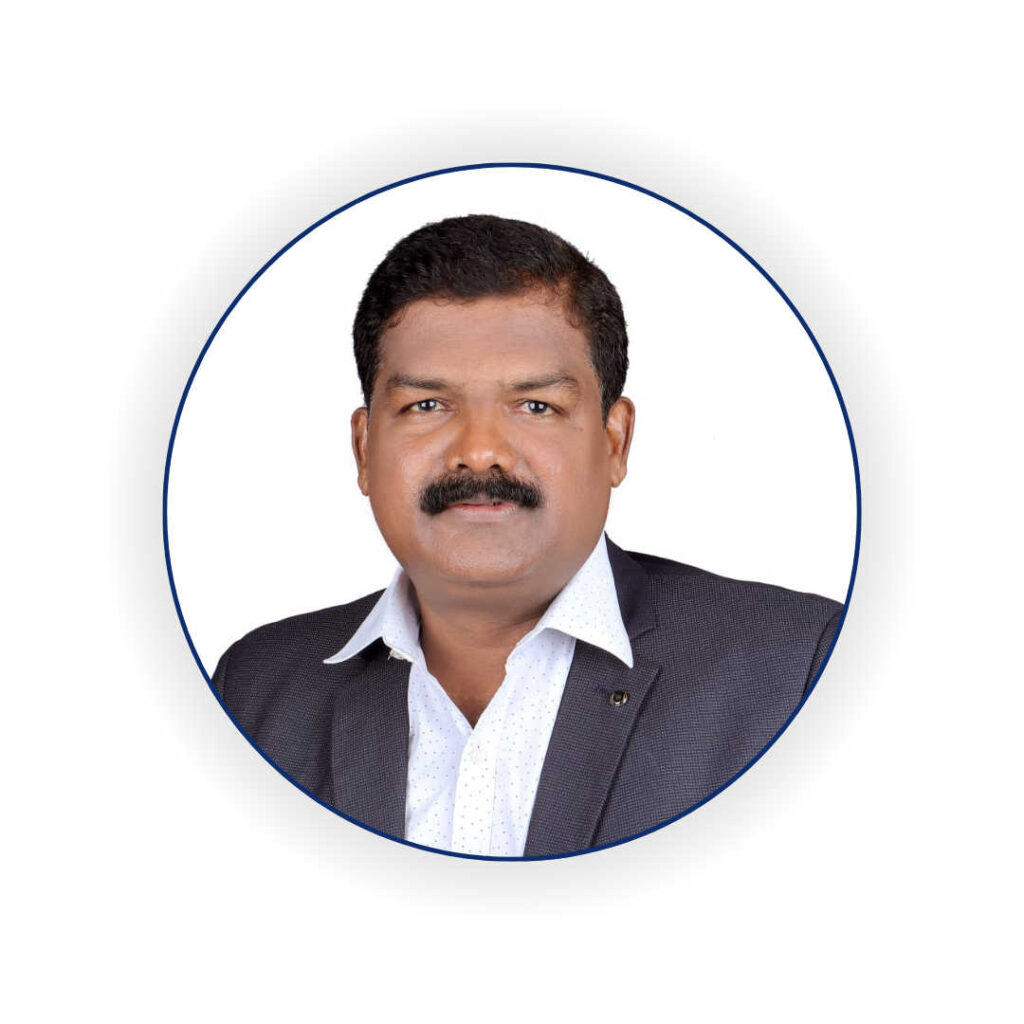
Dr. B. Vinayachandra Shetty
MD. (Ayu), PhD
Ayurvedic Consultant and Academician
Dr. Budunar Vinayachandra Shetty has a strong educational foundation with an MD in ‘Rasashastra” from SDM College of Ayurveda, Udupi, and a PhD in the same subject from National Institute of Ayurveda, Jaipur. He’s also a Recognised PG and PhD Guide from RGUHS Bangalore, India.
Dr. Vinayachandra Sir is a Healthcare Professional in the Ayurveda sector with over 2 decades of experience as a practitioner, academician, and researcher.
Career overview:
- CMO at Alva’s Ayurveda Medical College, Moodbidri since 2013 till 2019
- Medical Director, Kshemadhama Ayurveda Hospital Brahmavara, Udupi since 2019
- Managing Director, AYUSHDHAMA Ortho Neuro Hospital, Kundapura since 2020
- Doctorate (PhD) Guide and Postgraduate Teacher/Guide in the Dept. of Rasashastra and Bhaishajya Kalpana, Alva’s Ayurveda Medical College, Moodbidri, Karnataka, India.
- Examiner to the Undergraduate, Postgraduate, and PhD in RGUHS Bengaluru, KLE University, NIA Jaipur, Amrita University, Kollam and Maharashtra University of health sciences, KUHS, Trisur, NTR University of health sciences, Hyderabad.
- Presently, he’s the President of the Doctors’ and Allied Professionals Credit Co-Operative Society, which is India’s first healthcare financial service-providing co-operative organization.
Q 1: How many patients have asked you “How are you”? If you can roughly say it in %, how much that could be?
Ans: Very few. Mostly they may think that it is not a social decency.
Hardly 5% of clients would ask how are you.
Q2: What made you choose Ayurveda for your medical career?
Ans: I opted Ayurvedic course in 1993. At that time the sector was not that saturated and the qualified doctors’ number did not meet the needs of society.
Q3: What are the key differences between Ayurveda and the rest of the treatment methods?
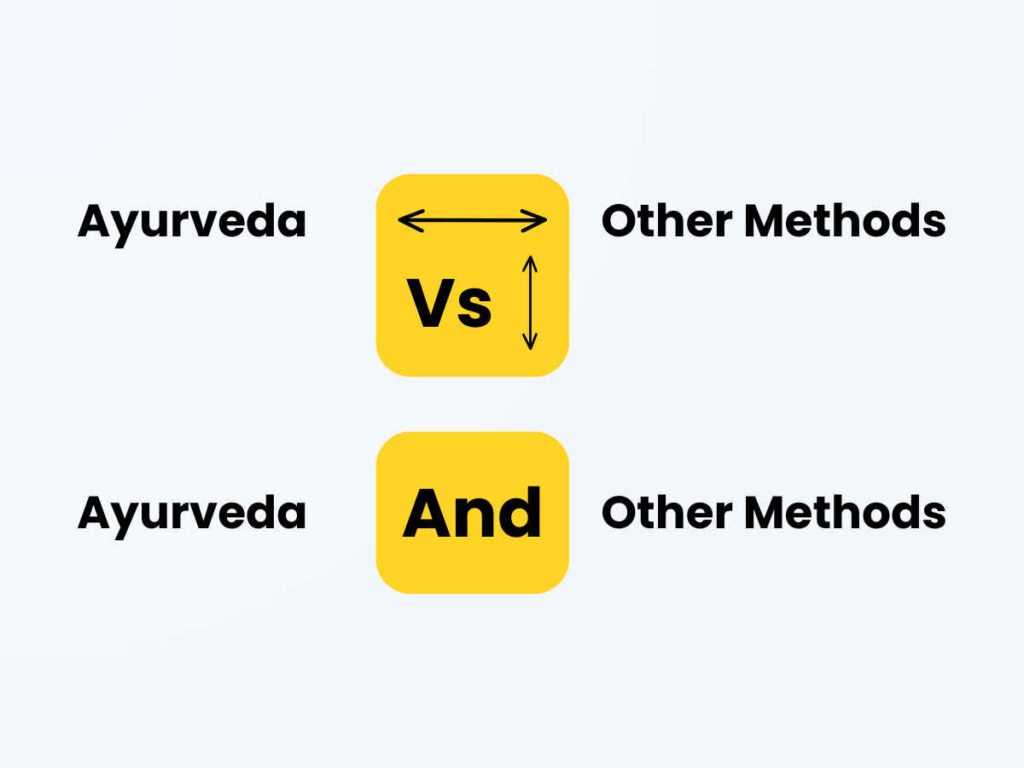
Ans: The fundamental approach is unique in Ayurveda.
Ayurveda believes in nature and human beings intimate inseparable relationship. Each and everything present in nature is directly responsible for the health and ill health of the person.
Mainly the whole principles of treating the cases depend on cause and effect theory. Ayurveda considers the body, mind, soul, and spirit as a whole while managing diseases rather than part of the body.
Q4: Would you like to give some statistics related to the success of Ayurvedic treatments?
Ans: More than 90% of neurological cases were cured by Ayurveda. 80 to 90% of infertility cases had good results. Degenerative Diseases also had 70 to 80% effectively treated
Q5: Can you please throw some light on the important wrong notions people have about Ayurveda?
Ans:
- Ayurveda has neither effects nor side effects.
- Ayurvedic curing rate is very slow.
- The simple massage itself is Ayurvedic Panchakarma.
- This system is only good for stroke and chronic conditions. It will damage the liver kidney and other vital organs.
- There are no treatments for Viral, bacterial, and communicable diseases.
These are a few notions often noticed in the community.
Q6: Is there a way for patients to decide whether they can go for Ayurveda or not? What should be the thought process?
Ans: Primarily patients should understand what exactly the authentic Ayurveda principles and practices are.
Except for emergency conditions where life-saving measures are required and surgery is needed, all other conditions can be effectively treated in Ayurveda.
Awareness about the system, doctor, and intervention is necessary. The success stories of the doctor are also important.
Mainly, the patient should be ready to follow the medications and strict diet patterns. They have to have patience and faith in the doctor because Ayurveda treats the person for his ailments rather than only the diseases.
Q7: What are a few genuine sources to learn about Ayurveda?
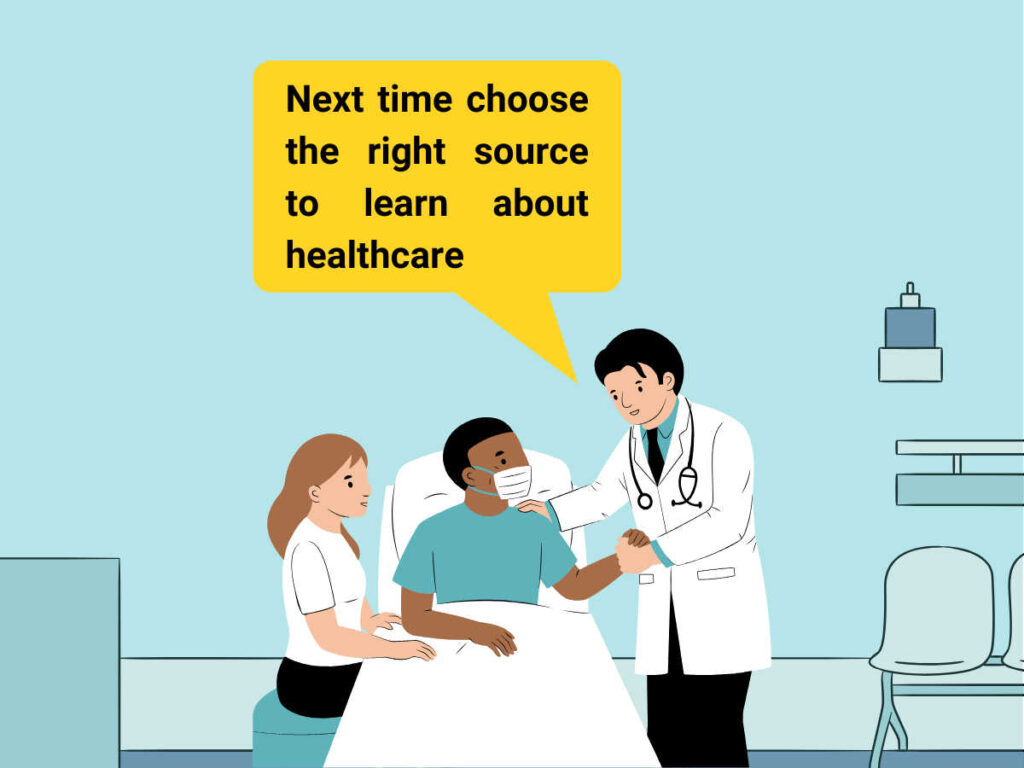
Ans: We should know the basic differences between knowledge and information. Hence, one should study the science systematically in approved and reputed institutions as a scheduled course.
Theoretical and extensive practical knowledge makes the person competent and gradual clinical experience makes them perfect.
NCISM-approved publication of classical texts and basic books of Ayurveda helps to understand science.
Sound knowledge of the Sanskrit language is really helpful in understanding the Ayurvedic principles and practices without any manipulated versions of the latest authors.
Q8: We are seeing manipulations, misleading, and selling the wrong products and services in the name of Ayurveda.
Correct.
Regulatory authorities, teaching institutions, and introspection of the doctors will give consoling remedies for this.
Q9: Being a well-qualified Doctor, can you please share your thoughts on the statement “prevention is better than cure” and its relevancy to the modern human lifestyle?
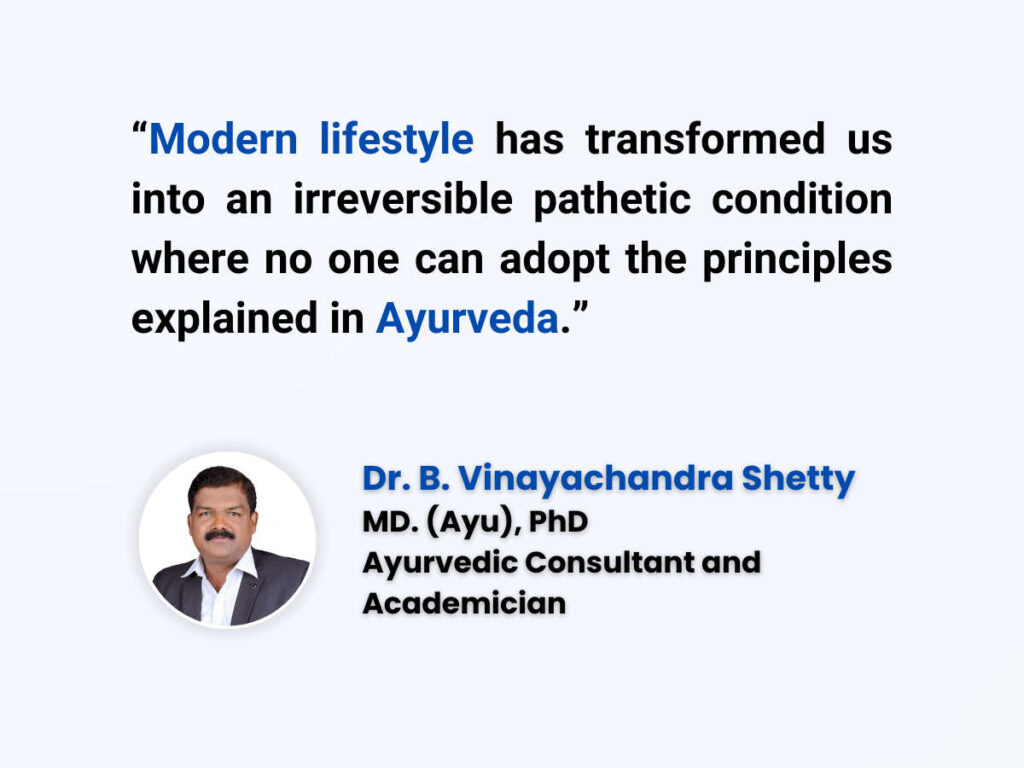
Ans: Ayurvedic’s first and foremost fundamental aim is the prevention of health.
If the cause itself is not there, then there is no question of diseases as an effect.
Modern lifestyle has transformed into an irreversible pathetic condition where no one can adopt the principles explained in Ayurveda.
We start the preventive measures since the production of healthy sperm and ovum to have healthy progeny. Hence each one should think and adopt Ayurvedic practices immediately after the marriage to have a healthy child and the coming generation becomes healthy.
With the help of information, one should understand the causes of various diseases and accordingly prevent such causes and adopt an ayurvedic lifestyle.
Q10: Finally, I would like to hear your words on the Mindset that is helpful for the present and future of well-being.
Ans: Food, Sleep, and Sexual practice are tripods for health.
One should be very keen about these three major areas.
Withholding some of the natural urges like urination, bowel, flatus, sneezing, etc ends up in diseases. Hence, one should not do so.
My Response
In day-to-day life, the conversations with doctors usually don’t go beyond one’s diseases and sufferings.
The reasons could be many.
When you’re sick, you don’t want to understand the best treatment methods and how they work. Even doctors are more concerned about relieving you from pain and suffering at that time.
If you don’t have any diseases, you probably don’t remember doctors (I too, unless I have a personal or professional relationship with them).
Doctors, on the other hand, are always busy as consultants, academicians, or in any other related activities for that matter.
Because they’re “practitioners”!
Anyway,
Thank You so much Dr. B. Vinayachandra Shetty sir for patiently answering questions despite your busy schedule.
It contains valuable information and knowledge that can be used directly or indirectly in daily life.
So, thanks once again.
About The Subject:
Ayurveda is an ancient Indian medical system and an in-depth subject with 3,000 to 5,000 years of history.
Having experienced undergoing the Ayurvedic systems to cure illness and injuries several times, I can say that it’s not about simply taking pills and trying to feel the ‘easiness’.
Rather, it requires a holistic approach towards health and well-being.
For the time being, I can’t stretch too much on this because of the next point.
That is,
Information Vs Knowledge:
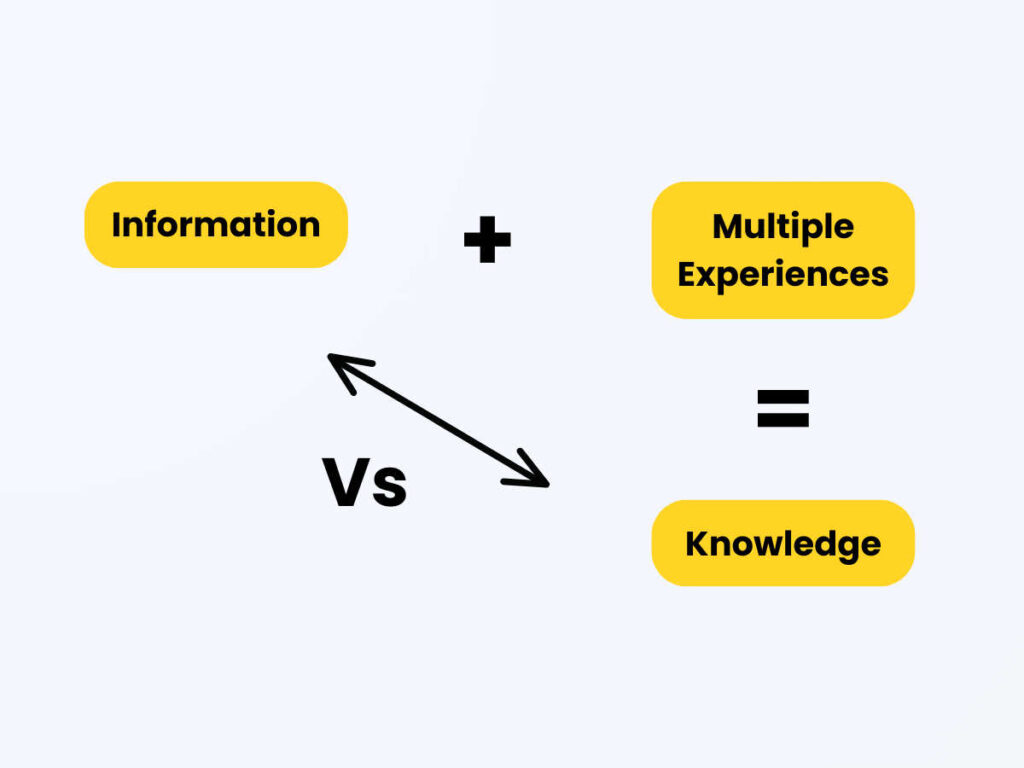
As Sir rightly pointed out, “We should know the basic differences between knowledge and information“.
Especially when it comes to consuming sensitive content related to health and finance. In this AI age, it becomes even more important to cross-verify the information before making risky decisions and acting upon it.
You might have observed that words like “Ayurveda”, “Organic”, and “Natural” are quite common in the modern content creation era.
Why?
Marketing Masala:
Being a writer, content creator, and online marketer, I would like to share my views on this.
Words like Ayurveda, Organic, and Natural are so powerful that they instantly make you feel trusted. Unfortunately, these are used to manipulate people to buy products and services.
Having said that, we can’t blame the entire creators or marketers ecosystem.
Understanding the basics of marketing as a career and relationship-related decision-maker, and consumer of content, products, or services is highly beneficial. That’s why I talk about it more often as a part of mutual learning and sharing.
Have you observed Dr. Vinayachandra Shetty Sir’s marketing understanding when he said;
I opted Ayurvedic course in 1993. At that time the sector was not that saturated and the qualified doctors’ number did not meet the needs of society.
There it is. An on-spot example. It is quite simple, yet powerful.
Going To The Roots:
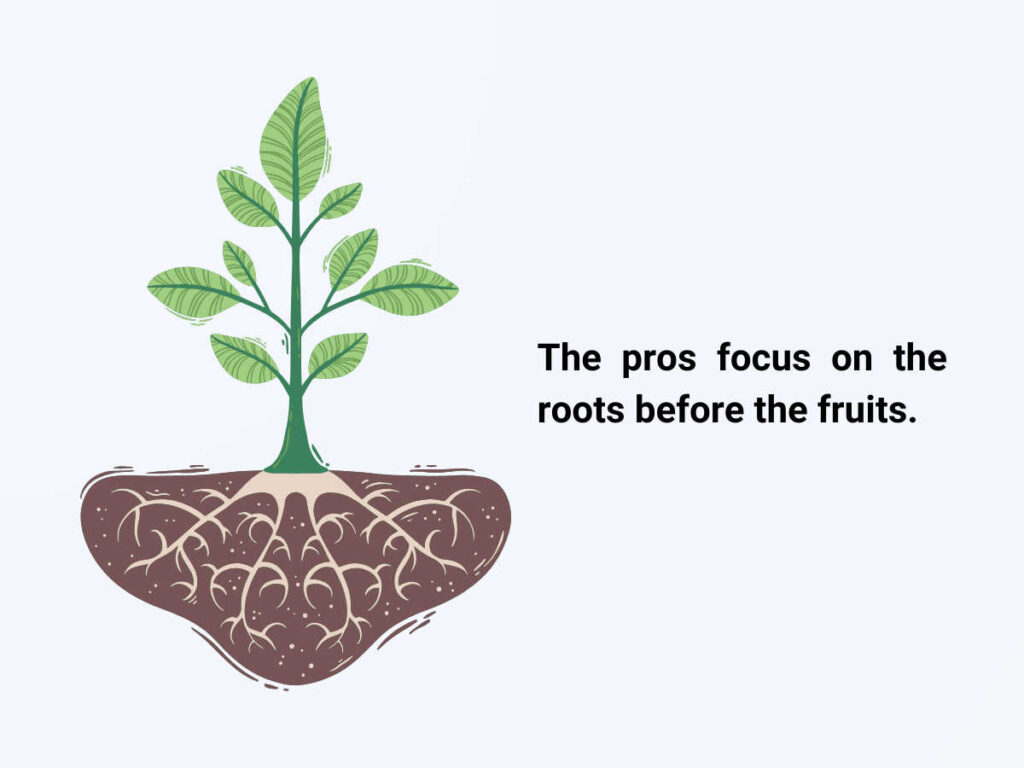
The nature of experts is to go to the root of problems in any field.
Not only does the bio of Doctor Vinaya Sir show the expertise but the answers he gave as well.
He not only listed out the common notions people have about Ayurveda but also did not forget to accept its limitations.
The doctor not only said that Ayurveda is about working at the root level but also pointed straightly to focus on healthy reproduction process and wholistic thinking of future generations as well.
The mindset of going to the root level is also helpful in wealth creation, wealth management, and relationship management aspects of daily life.
Of course, “Genuine doctors are the wealth of the society”.
Not just that. “Vaidyo Narayano Harihi”, is a saying in the Sanskrit Language. Which means “Doctor is equal to God” or “Doctor is a God”.
Remember what Dr. Vinayachandra Shetty sir said?;
“Sound knowledge of the Sanskrit language is really helpful in understanding the Ayurvedic principles and practices without any manipulated versions of the latest authors.”
Frequently Asked Questions (FAQs):
Conclusion:
To sum it up, this Q&A with Dr. B. Vinayachandra Shetty is a good starting point to explore Ayurveda if you’re interested in it.
The doctor made it easy to understand the basic mindset required to learn, undertake, and adopt Ayurvedic systems by mentioning common notions, treatment methods, and success rates.
As we dig a bit deeper into Q&As, there are good passive learnings that can be applied in daily life.
Some of them are differentiating information and knowledge, the importance of understanding modern marketing, and building the habit of going to the root of problems wherever necessary.
Constantly switching from technical person to being a caring dude is another art that is worth learning from doctors.
So asking “How are you?” naturally makes them more happy, I guess.
In fact, the same question was the starting point of this whole Q&A and learning journey. I have shared this on a LinkedIn post as well.
Have any questions?
Communicate through the comment box.
Share this post with your near and dear ones.

Author and Publisher
Shreenidhi K
Hey, I’m Shreenidhi. I have created SharingShree to mutually learn and share content including experience and knowledge gathering while providing online marketing services for businesses through OnlineShree. Know More.
